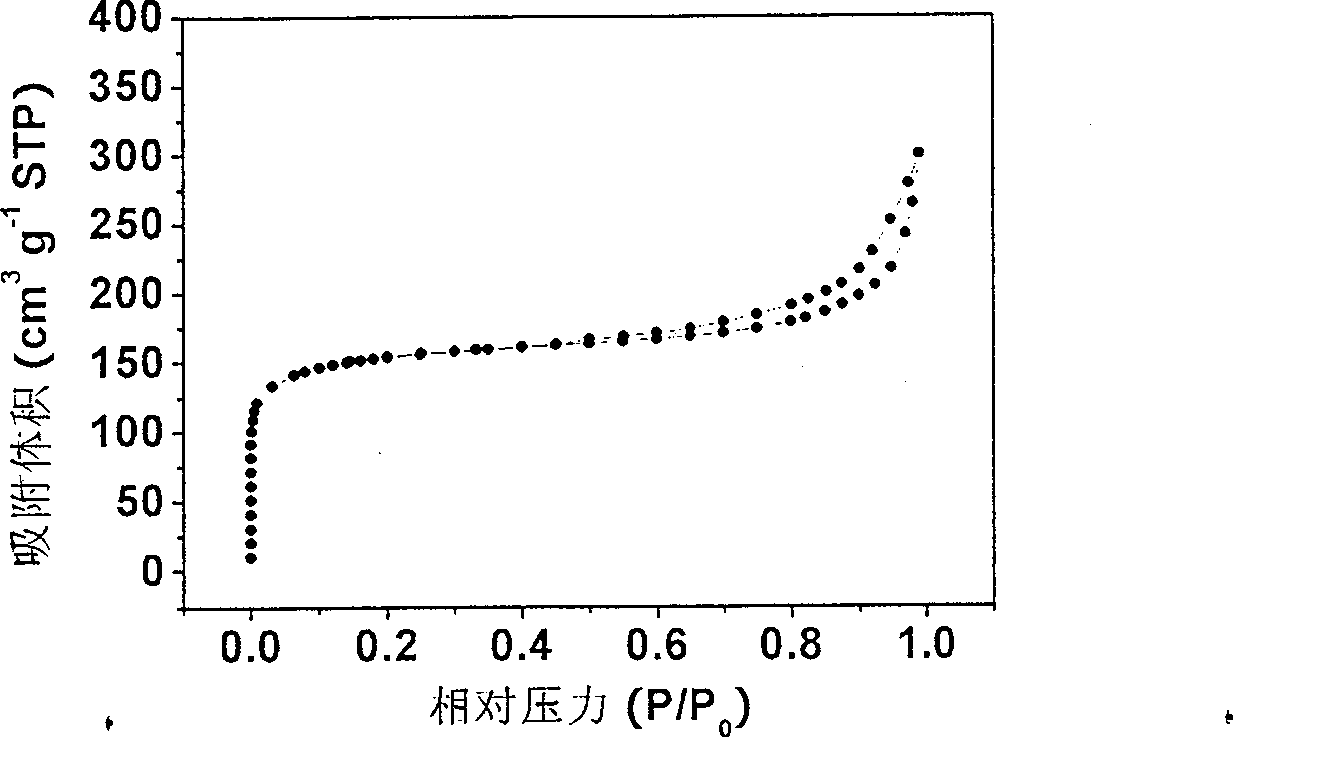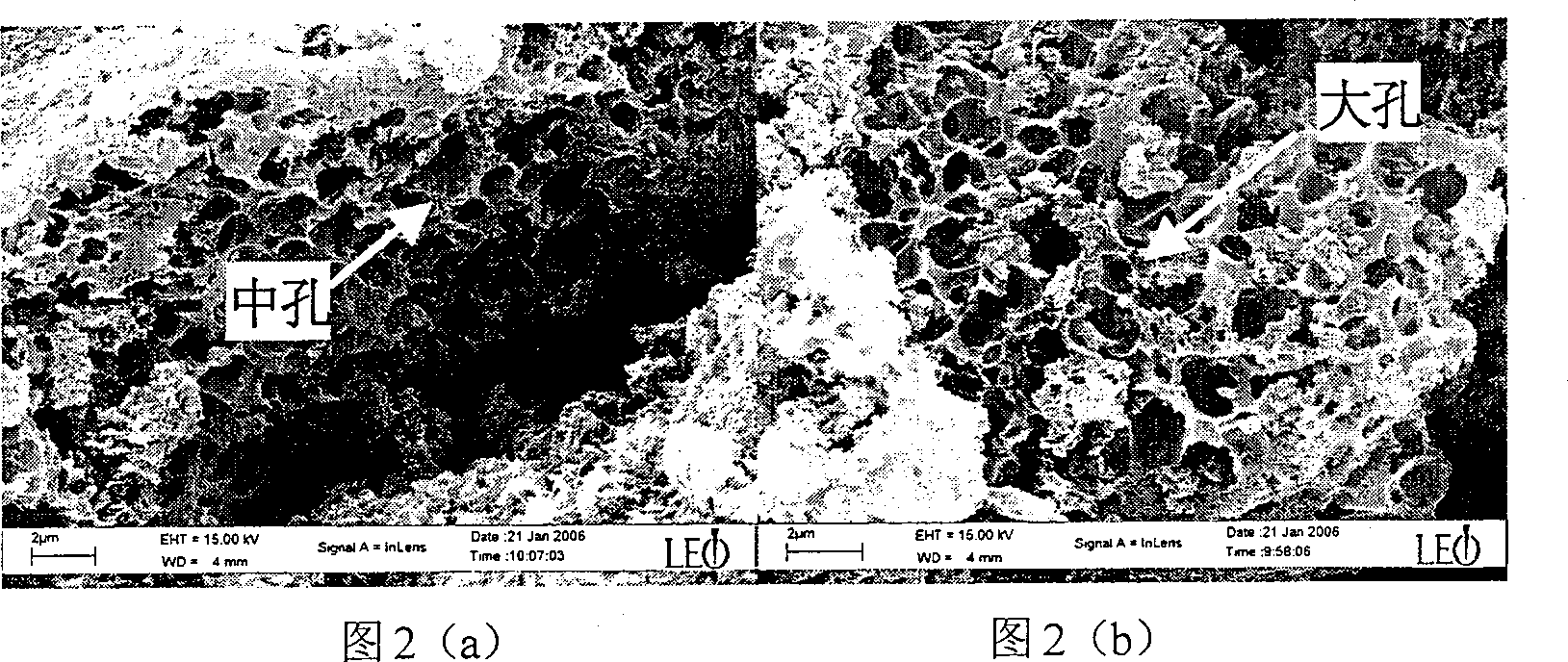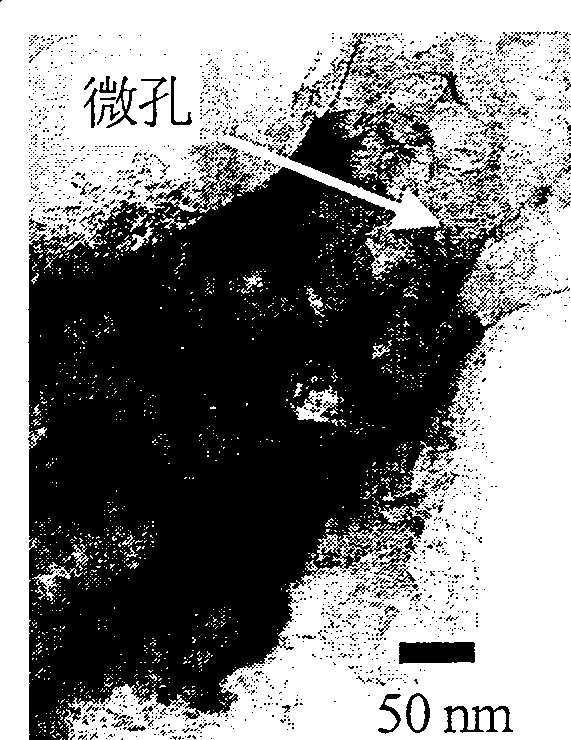Layer combination controllable carbon material with nano pole of different scale, preparation method and application
A technology of carbon materials and nanopores, applied in the application field of electrochemical capacitor electrode materials, can solve the problems of low content, poor structure reproducibility, improvement of limiting performance and broadening of application range, etc., to achieve the effect of high-efficiency ion transmission capacity
- Summary
- Abstract
- Description
- Claims
- Application Information
AI Technical Summary
Problems solved by technology
Method used
Image
Examples
Embodiment 1
[0022]Magnesium acetate and water are mixed according to the weight ratio of 1:4 and completely dissolved to form solution I. Sodium hydroxide, P123 and water are mixed and dissolved completely according to the weight ratio of 1:0.5:30 to form solution II, and then the above two solution systems are stirred and mixed at 20°C, and the weight ratio of magnesium acetate to sodium hydroxide is 1: 1, under the action of strong base (NaOH), make magnesium salt form its hydroxide sol, add the ethanol solution of alcohol-soluble phenolic resin (the weight ratio of phenolic resin and ethanol is 1:4), the mixture of phenolic resin and described magnesium salt The weight ratio is 1:1. After the phenolic resin is completely precipitated under the action of water, the solvent water and ethanol are evaporated and removed at 60°C (48 hours), and the phenolic resin / hydroxide composite material can be obtained, which can be carbonized ( 600°C, 6 hours, ammonia gas), washed with hydrochloric ac...
Embodiment 2
[0027] Nickel nitrate and water are mixed and dissolved completely according to the weight ratio of 1:5 to form solution I. Urea, CTAB and water are completely dissolved in a weight ratio of 1:1:20 to form solution II, and then the above two solutions are stirred and mixed at 90°C. The weight ratio of nickel nitrate to urea is 1:3, and nickel nitrate in urea Form its hydroxide sol under hydrolysis, add the ethanol solution of alcohol-soluble phenolic resin (the weight ratio of phenolic resin and ethanol is 1:3), the adding weight ratio of phenolic resin and described nickel salt is 1:1, treat phenolic resin After the resin is completely precipitated under the action of water, the solvent water and ethanol are evaporated and removed at 60°C (48 hours), and the phenolic resin / oxide composite material can be obtained, which is then carbonized (700°C, 6 hours, argon), and used Wash with hydrochloric acid to remove the template, mix the carbonized product and hydrochloric acid at a...
Embodiment 3
[0031] Zinc chloride and water were mixed and dissolved completely in a weight ratio of 1:5 to form solution I. Sodium carbonate, Brij30 and water are mixed and dissolved completely according to the weight ratio of 1:1:30 to form solution II, and then the above two solution systems are stirred and mixed at 10°C. The weight ratio of zinc chloride to sodium carbonate is 1:3, Zinc chloride forms its carbonate / oxide composite sol in the double effect of carbonate ion and water, adds the ethanol solution of alcohol-soluble phenolic resin (the weight ratio of phenolic resin and ethanol is 1:6), phenolic resin and described zinc The weight ratio of the salt added is 1:2. After the phenolic resin is completely precipitated under the action of water, the solvent water and ethanol are evaporated and removed at 60°C (48 hours), and the phenolic resin / oxide composite material can be obtained and carbonized (800°C, 5 hours, argon), washed with hydrochloric acid to remove the template, mixe...
PUM
| Property | Measurement | Unit |
|---|---|---|
| specific surface area | aaaaa | aaaaa |
| pore size | aaaaa | aaaaa |
| pore size | aaaaa | aaaaa |
Abstract
Description
Claims
Application Information
 Login to View More
Login to View More - R&D
- Intellectual Property
- Life Sciences
- Materials
- Tech Scout
- Unparalleled Data Quality
- Higher Quality Content
- 60% Fewer Hallucinations
Browse by: Latest US Patents, China's latest patents, Technical Efficacy Thesaurus, Application Domain, Technology Topic, Popular Technical Reports.
© 2025 PatSnap. All rights reserved.Legal|Privacy policy|Modern Slavery Act Transparency Statement|Sitemap|About US| Contact US: help@patsnap.com



